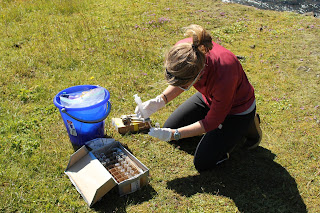We are a group of freshwater ecologists from the Biology Department at St. Catherine University in Saint Paul, Minnesota. Our research takes us to Iceland and other arctic regions where we are working to understand how temperature influences nitrogen fixation rates and metabolism in cyanobacterial assemblages. Nitrogen fixation is extremely sensitive to temperature and therefore nitrogen gas from the atmosphere may become more accessible to freshwater ecosystems as the climate warms. We are working to understand the potential ecological and environmental implications of changes in cyanobacteria species composition and nitrogen fixation rates in arctic lakes and streams.
Thursday, September 19, 2013
10,000 New Ways to Think
Research is a process - it is about discoveries, about making mistakes, taking risks, trying new approaches, and sometimes starting over. We always learn from our mistakes and new approaches, gain some knowledge from the risks, and start over while remembering where we went astray. Thomas Edison once said about the process of inventing the light bulb, “I haven’t failed. I've just found 10,000 ways that don’t work.” This is the part of research that I love. I can go to work every day and not necessarily accomplish what I set out to do, but I will have learned something meaningful, even though it may not be what I expected. After days of preparation, packing, and test runs, you get up at 7 am, drive an hour to get to your field site, set up, and run an experiment, and the outcome may be totally unexpected; but, that doesn't mean that the day was a failure. In fact, through this process of trial and error, we find better and more efficient ways to make our measurements, and ultimately, the outcome and science is better for it! This process leads us to question our approaches and always be thinking about the unexpected. There are no rules for figuring out an answer, or guidebooks that will tell us in which direction to start. This is why research is such a creative process and requires a lot of flexibility and the ability to think in new ways.
One of the most rewarding experiences that I had this summer was the opportunity to design my own experiment and take charge of all of the details. Curiosity drives research, so I had to first ask myself, what am I curious about? After the course of a couple weeks in the field using three methods to measure nitrogen fixation, I asked myself, why can’t we use just one method, or what are the advantages and disadvantages of each method, and what can we understand better that will convince us of the accuracy of these methods? Then, I had to devise an array of field measurements using each of our methods that would provide some insight into where the discrepancies between the methods lies. The first day that I was in charge of the field team, I was running on adrenaline, not knowing what the results would reveal, or how the day would go.
I was counting and numbering vials, double-checking supplies, and packing extra everything, just in case. I was the one who had to delegate the tasks and provide the itinerary. I made some mistakes, and miscounted a few vials (which turned out to be a great learning experience in and of itself), but at the end of the day, it was a great success. I felt accomplished. We had new and novel data that will help us to better evaluate the methods for measuring nitrogen fixation, which will be an important contribution to the field. It was gratifying to complete a portion the large international collaborative project that I had designed. It gave me confidence in relying on myself and my own ideas, and brought even more questions to my attention that I hope to pursue in the future as I continue to do more research.
Friday, September 6, 2013
How Did It Get So Late So Soon?
 |
| Thumbs up for science! |
It’s hard to believe that we are
back in Minnesota already. I cannot believe how the time has
flown. It is great to be home, but I found myself having a hard time
leaving Iceland. There is so much left to do and experience! I look forward to
the day when I can return. The field days are over for now, but the fun in the
lab is just beginning. We were able to accomplish so much this summer and
I am looking forward to running samples, as well as analyzing and interpreting
the data this fall.
Four
months ago, I would have never dreamed that I would travel to another country
for the summer and be able to do cutting edge research with a gorgeous
backdrop. The days were long and sometimes the weather didn't cooperate,
but I never felt like I was going to work. I enjoyed the challenges that we
were faced with every day and the satisfaction that comes from knowing
that no matter the obstacle we faced, we were able to overcome it and find our
own creative solution.
 |
| One of the final times working with these chambers. Oh, how I miss them! |
Before this trip, I will admit that
I was hesitant and unsure about my abilities as a scientist. This
experience has given me the confidence to know that sometimes, more often than
not, something isn’t going to work, but I also know that I will figure out how
to make it work. Yes, that is the research process in action and I have a
much stronger understanding of the scientific process and the creativity and
trial and error involved.
Subscribe to:
Comments (Atom)

